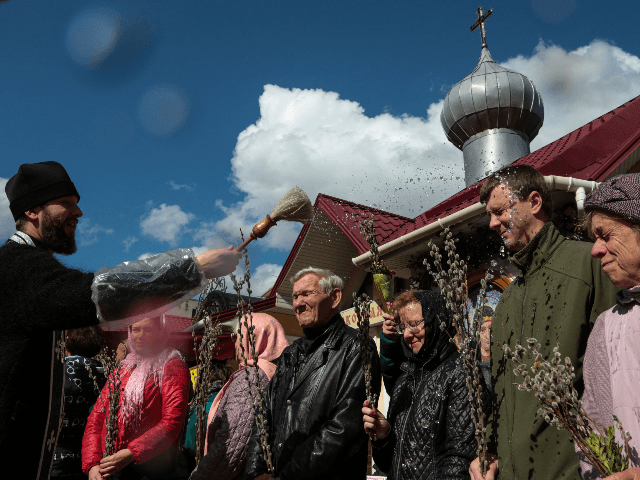The primate of the Orthodox Church of Ukraine said on Tuesday that Russian forces occupying the Crimean peninsula are planning to demolish an Orthodox Church temple in the town of Yevpatoria.
Metropolitan Epiphanius Dumenko linked the proposed demolition to the shuttering of the Cathedral of St. Vladimir and St. Olga in Simferopol this year.
“I urge the Ukrainian government to finally make a decision, which, unfortunately, has not been taken in the previous years to resolve the issue of ownership of the premises of the cathedral and the diocesan administration in Simferopol. This step will demonstrate legal and moral support to the Ukrainian community in Crimea from our state and will provide an opportunity to more effectively protect [the community’s] rights at the international level,” he said in a Facebook post translated by Ukraine’s UNIAN Information Agency.
The Orthodox Church of Ukraine (OCU) was established soon after Ukraine became independent in 1991. It broke away from the Russian Orthodox Church over strident objections from Moscow and was formally recognized by the Orthodox Patriarchate of Constantinople at the beginning of this year. Primate Epiphanius, often referred to as “Epifaniy” in Ukraine, assumed his office in February. The Church of Greece recognized the OCU after a meeting in October, the first Eastern Orthodox church to do so.
Epifaniy told UNIAN that over 500 parishes that were formerly allegiant to the Moscow Patriarchate have changed their denominations to OCU over the past six months. Debate over whether to break with Moscow and join the OCU has been acrimonious in many Ukrainian churches, as parishioners are well aware of the secular political dimensions of their choice. There have been allegations that the Orthodox church aligned with Moscow represents a “fifth column,” an agent of Russian influence in Ukraine.
There was some drama when Epifany became primate because the founder of the OCU, who had declared himself Patriarch Filaret, was obliged to step aside – recognition from Constantinople did not provide for a patriarchal position – and is now known as “Honorary Patriarch Filaret.” Several smaller branches of the Ukrainian Orthodox faith had to be folded into the OCU, a process that was not free of grumbles.
“We have entered a new period, where the task is to unite all the Ukrainian Orthodox faithful into one church, but the process is painful. There is big resistance from Moscow. But if God blessed Ukraine to become an independent state, we are sure he also gave his blessing to an independent church. Without an independent church, the state can’t survive,” the feisty Honorary Patriarch Filaret said in April, making the political significance of the new church clear.
The European Council on Foreign Relations noted in May that Russia sees the establishment of the OCU as a major political loss, one that it might not be inclined to accept. Russian President Vladimir Putin has made Orthodox revival a major theme of his political campaigns and sees the church as a “soft power” instrument of Russian policy – virtually a government ministry, in the eyes of some observers.
The Russian Orthodox Church advances the idea of a “Russian world” that includes nominally independent entities such as Ukraine and made efforts to keep the Ukrainian church from breaking away even after the annexation of Crimea. The Patriarch of Moscow, Kirill Gundyaev, very pointedly refused to attend a victory celebration held by Putin after Crimea was taken, even though he is a close Putin ally who once declared the Russian president to be a “miracle from God.”
Kirill was not able to keep the Ukrainian church under Moscow’s wing, so now the Russians are doing all they can to boot the OCU out of Crimea. The Moscow-controlled administration in Crimea filed a lawsuit in March to evict the OCU from the peninsular capital of Simferopol, claiming it did not file the necessary paperwork to remain in operation and “has no reason to remain in the building it occupies.”
The building in question, the Cathedral of St. Vladimir and St. Olga mentioned by Epiphany in his Facebook post on Tuesday, closed its doors in September to the great dismay of Ukrainians living in Crimea.
A lawyer representing the OCU said it has become “a pain in the neck for the occupying authorities because it is an isle of Ukrainian Orthodoxy, where people can speak the Ukrainian language, an isle where people help each other.” The lawyer offered this observation anonymously because he feared reprisals from Russian officials.
“You go there, enter the church, leaving behind all these pro-‘Russian world’ surroundings, and feel like you are back home, in Ukraine. It is impossible to explain. You can only feel it,” he elaborated.
Father Kilment, head of the Cathedral of St. Vladimir and St. Olga, spoke even more bluntly.
“Russia wants nothing Ukrainian in Crimea. The methods of achieving this all are sophisticatedly worked out: someone is thrown in prison, someone is killed, someone is barred from entering the territory of Crimea,” he said.
As for the Ukrainian Orthodox temple in Yevpatoria, local church officials accused the Russians of plotting to demolish it as far back as March. As with the cathedral in Simferopol, the Yevpatoria church was accused of not filing the correct paperwork to secure its legitimacy as a house of worship.

COMMENTS
Please let us know if you're having issues with commenting.